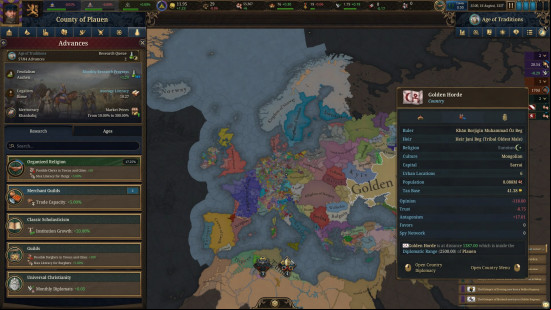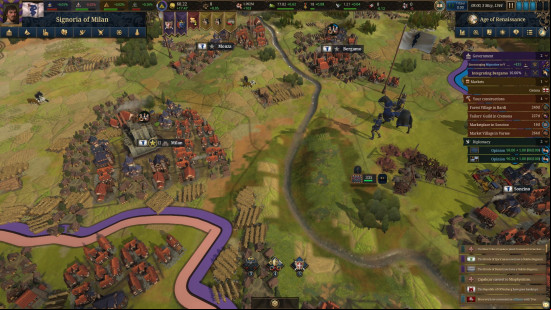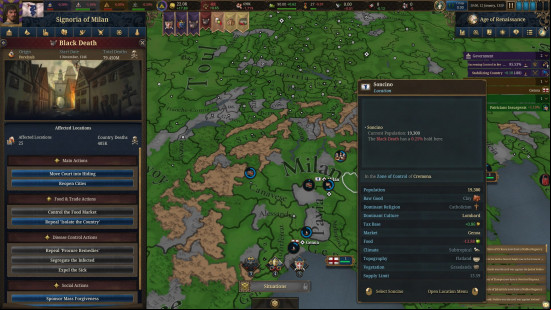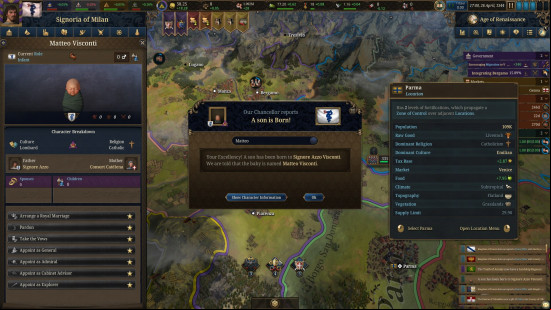Strategy games aren't defined by polygon counts and ray-traced lighting, the regular markers of spectacle in most other videogame genres. A game like Dwarf Fortress can be spectacular with no graphical depictions of reality, because its spreadsheet simulation is so vast as to feel like a reality of its own. The long-awaited Europa Universalis 5 is spectacular, not because of its visual fidelity (though it has touches of beauty), but because of the sheer size and complexity of its simulation. At first blush, this early build of EU5 overwhelmed me. As I acclimated to it, I found an emotional and intense strategic challenge unlike anything else I've played. When it releases, Europa Universalis 5 will perhaps be the best way to experience the mathematical sublime on PC.
For the unfamiliar,grand strategy games. The likes of Crusader Kings or Hearts of Iron model relatively specific moments in time (medieval dynasties and WW2, respectively), whereas EU is broad, covering the span of human history from the 14th to the early 20th century, with the ability to play as most nation states (and quite a few smaller governments, tribes, etc).

The mark of the best strategy games is not how realistic or objective its simulation is, but how powerfully it implements its ideas and how compellingly the player can interact with them. By this metric, EU5 is so far a success, but it's still subtle and complex enough that its pleasures might take more time to fully understand. Over my 12 hours with the game, I played as Milan, Morocco, and Plauen (a tiny German town I lived in as a student) to test the granularity of its systems. Thanks to its changes to established EU formula, the game scales nicely and plays well with both small and larger nations.
For example, EU5 models its populations with individual units called 'pops,' rather than gigantic population blocks. Each pop unit is associated with a location, a culture, a religious background, etc. This system means the game has a serious model for diverse populations and a straightforward route of showcasing tensions and unities between groups. Playing as Milan, I got an event that pushed my agrarian economy to one based on metalworking. The benefits seemed straightforward and obvious, but I saw that embracing this new industry would disempower Milan's rural Jewish population. It was a disquieting reminder of how 'progress' can leave the least powerful behind.

Also new is a suite of automation systems. To start, EU5 sorts its systems into four basic buckets: gardener (choosing technological/cultural advances, managing cabinets and parliaments), explorer (sending out ships, establishing colonies), trader (constructing buildings and selecting what they produce, exchanging goods with other countries), and conqueror (creating and maintaining armies). At the start of a new game, you can choose to automate any of these broad categories and get even more granular during the match, automating specific elements like what goods any building should produce or auto-running a parliamentary session. This has the obvious function of making the game more approachable while also enabling customization, allowing you to ignore systems you don't care about and highlight the areas you want to focus on.
Policy sliders return here, with each representing opposing poles of political thought (Individualism vs. Communalism or Traditionalist vs. Innovative). Policy changes, responses to new events, and researching emerging technologies influence how your nation evolves. That said, every nation starts with its own power structures. You can alter an aristocratic government to an egalitarian one, but doing so would be an uphill battle. On one hand, this proves the limitations of even EU5's robust and powerful simulation. It's a game about reform and making small, incremental changes to big systems. It has models for revolution and rebellion, but the player is presumed to be on the opposite side of them. You are the state; you cannot rebel against it. On the other hand, this emphasis turns you into equal parts agent and victim of history. You are a disembodied power, floating from leader to leader, making them follow your whims. However, big historical events like the Hundred Years War, the Bubonic Plague, and the Reformation are more or less completely out of your hands. You can only choose how to react to them. Without knowledge of EU5's extensive systems, your response might prove inadequate.

I spent most of my time with EU5 as Milan, playing through a good chunk of the game's first hundred years, which included the advent of the plague. Before the disease started, I had struggled to staff my buildings and produce enough goods to prevent starvation. As a massive chunk of my population died during the onset of the plague, my earlier mistakes compounded, ensuring my citizens were unprepared for this crisis and unhappy at how I had handled it. The helplessness I felt as I watched my mistakes escalate this catastrophe was oddly moving. To be sure, EU lacks the individualized human drama of Crusader Kings, but it has a sweeping systemic power.
But that power is showcased at even a micro level. Playing as Plauen, I had only two rural provinces under my control. My military might was non-existent, my independence only nominal. Yet I was still making interesting decisions every month that changed the direction of my minuscule nation. Playing as Morocco was overwhelming in scale; I fought wars and managed an expansive (but still nascent) trade network. Plauen was also confounding, but in the opposite direction. I had so little power, so every choice felt all the more impactful.

Development is still at a relatively early stage, with visual changes aplenty to come and still no solid EU5 release date, but I came away finding a lot of enjoyment in the way it looks – something I cannot say for its predecessor. The maps are a real pleasure to tinker with. The terrain map is just handsome. You can zoom in and see little villages and roads. The landscape changes with the seasons, whitening with snow or blooming with spring. It's also fascinating to tinker with the modular map settings, which let you view trades, religious affiliations, literacy rates, and much more. This spreadsheet grandeur is spectacular in its own way.

It's gauche to come to serious conclusions about performance for such an early build, but I could feel my mid-range computer struggle against EU5's simulation. It's obviously possible, even likely, that any performance issues will be less severe upon release. However, if you're excited to boot it up at launch, it might be worth investing in some upgrades to your rig.
There's no doubt that Europa Universalis is an acquired taste. Like its predecessors, EU5 takes serious effort to understand and an immense amount of time to even play a single match of. But at the other end of that understanding and time is a powerful and robust strategic experience like no other. In other words, I enjoyed what EU5 is right now, but I'm very much looking forward to seeing what it becomes.
